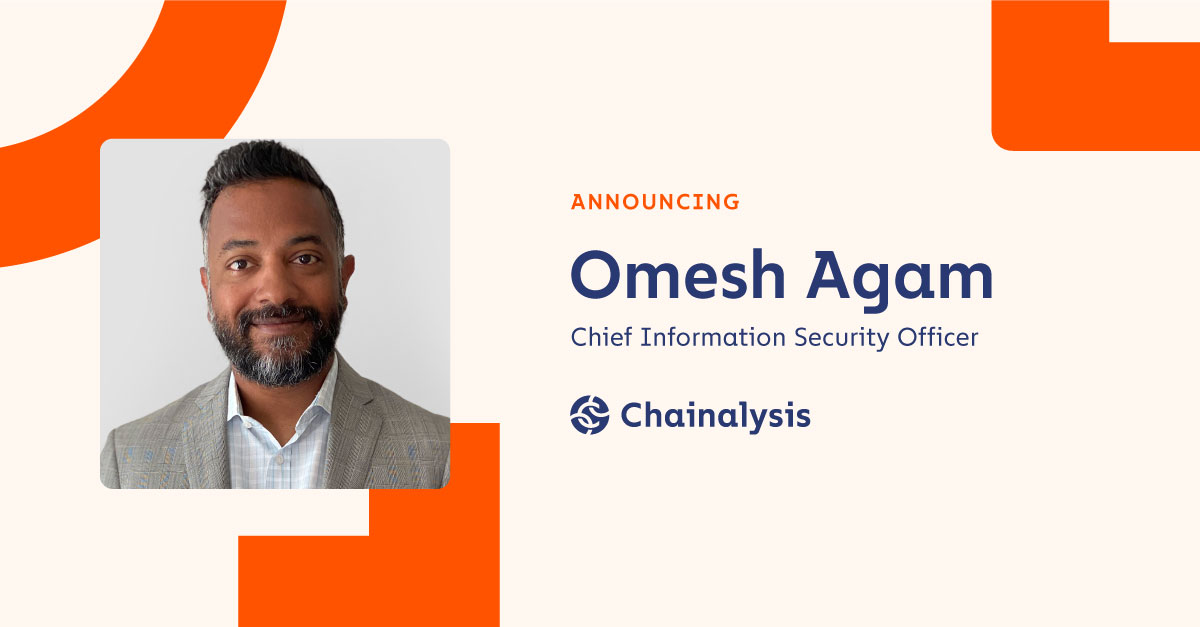Chainalysis is excited to announce that Omesh Agam has joined the company as the Chief Information Security Officer (CISO). Omesh has more than 20 years of experience in cybersecurity, having served in leadership positions for global security operations, security engineering, and all facets of cybersecurity strategy.
Prior to joining Chainalysis, Omesh served as CISO responsible for trust and security at high-growth technology companies Celonis and Appian. He is an active mentor to cybersecurity startup founders and served as an advisory board member to the Department of Electrical and Computer Engineering at the University of Maryland. He will lead the company’s global security team, including security engineering, operations and compliance.
We sat down with Omesh to learn more about his career and his vision for the team’s future.
What most excites you about joining Chainalysis?
I am tremendously excited to join Chainalysis as the company gears up for its next chapter and continues to build on its industry-leading position by building trust in blockchains. The company and its incredible platform and team have amassed countless examples of the value they provide to organizations across the public and private sector, and the wins they’ve been able to achieve when it comes to stopping illicit activity around the world.
I look forward to working with the security team and folks across Chainalysis to contribute to this important mission, and am pumped to dive in and help securely scale the platform and organization.
What opportunities do you see in the cybersecurity space?
There is endless opportunity in the cybersecurity space, and it’s an incredible time to be getting your hands dirty doing this work. Efficient collaboration in cybersecurity partnerships is essential for organizations. Aligning security strategies with overall goals, such as integrating security measures into product engineering and coordinating risk teams with GTM teams, requires consistent effort. Vendors must ensure seamless integration of their products with various user groups, prioritizing inclusion in developer workflows for comprehensive security analysis.
The cybersecurity industry has a significant opportunity to improve operational efficiency by leveraging diverse data sources. Analyzing scan data, security processing data, research data, and logs can identify and address operational inefficiencies. This data-driven approach enhances automation, accelerates processes, and reduces overall security risks. For cloud-native workloads, insights from the application tier to initial development stages can streamline secure design, minimizing post-deployment updates and strengthening overall security.
How would you define your leadership style?
My leadership style is characterized by a blend of respectful dissent and a deep sense of security empathy, all underpinned by a strong, team-wide ability to collaborate widely across the business. I place a huge value on actively fostering conversations that embrace diverse and opposing viewpoints, firmly believing that such discussions, rooted in data and research, fortify our overall positions.
I find the inclusion of non-security professionals in our work to be particularly important, as their involvement often brings forth business or operational insights that may have been overlooked initially. Cultivating security empathy is paramount as our organization grows: by recognizing that everyone is dedicated to aligned goals, the security team plays a pivotal role in facilitating progress, providing education, and collaboratively working with other teams to achieve our shared objectives.
Who is a leader you admire, and why?
Major Richard Winters — who was also depicted in the mini-series Band of Brothers — has leadership qualities that I admire. Specifically, his care for the team, his leadership from the front, and using careful, thoughtful analysis when conducting operations.
What are your hobbies and interests outside of work?
Spending time with my family and motorcycle racing occupies almost all of my personal time. Specifically supporting my two young sons who both race grand prix style racing motorcycles on kart tracks and in full sized race-tracks across the country. We’re either training or racing almost every weekend of the year.
